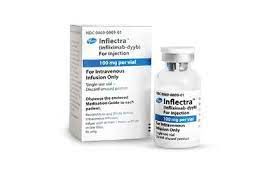- Bone Health
- Immunology
- Hematology
- Respiratory
- Dermatology
- Diabetes
- Gastroenterology
- Neurology
- Oncology
- Ophthalmology
- Rare Disease
- Rheumatology
Pfizer Resolves Antitrust Lawsuit With J&J Over Remicade
Without disclosing terms, Pfizer said it has settled with Johnson & Johnson (J&J) over a long-running dispute in which J&J was alleged to have blocked payers from covering Inflectra.
Pfizer and Johnson & Johnson have privately settled long-running litigation over alleged anticompetitive practices in the infliximab market. Pfizer had accused J&J of contracting with payers and providers to restrict the use of Pfizer’s infliximab biosimilar (Inflectra), which was launched in 2016, in favor of J&J’s originator product, Remicade.
Infliximab is an immunosuppressor for the treatment of rheumatoid arthritis, ankylosing spondylitis, Crohn disease, and ulcerative colitis, among other conditions. Remicade was first approved in 1998.
Commenting on the litigation, Pfizer said parties to the case had “agreed to resolve and dismiss all claims.” Terms of the settlement were not disclosed.
Pfizer said it will continue to sell Inflectra in the US marketplace. The company said it “has begun to see progress in the overall biosimilars marketplace in the United States. However, changes in policy at a government level and acceptance of biosimilars among key stakeholders are critical to deliver more meaningful uptake so patients and the healthcare system at-large can benefit from the cost savings these medicines may deliver.”
Background and Allegations
Pfizer filed suit against J&J in 2017 alleging that anticompetitive practices by J&J were preventing providers and patients from using Inflectra even though it was available for an average selling price of 10% less than Remicade.
Pfizer alleged that insurers originally showed no coverage preference for Remicade and allowed doctors to use Inflectra freely, but then “reversed course” after J&J began threatening to withhold rebates unless payers agreed to “biosimilar-exclusion” contracts.
Remicade payer contracts allegedly were written to deny reimbursement for Inflectra unless Remicade was proven ineffective for patients.
Pfizer maintained that this not only caused a reluctance among doctors to stock Inflectra in their pharmacies but also caused some to avoid treating Medicare and Medicare patients with Inflectra, for which coverage was available.
For its part, J&J countered that Pfizer's own sales practices were to blame for lackluster Inflectra sales and that it could have structured its sales contracts more effectively to achieve better performance. J&J responded that Remicade was a well established product and that patients and providers were still unfamiliar with biosimilars and consequently leery of them. It was also contended that Pfizer had not established that Inflectra was available at a lower cost than Remicade, given the sum total of pricing incentives offered by J&J.
The FDA's Gottlieb
The case put a spotlight on the use of "bundlied contracts," or the manufacturer practice of tying promotional deals for one pharmaceutical product to use of another. These lucrative deals have led to "anemic" biosimilar competition, according to former FDA Commissioner Scott Gottlieb.
In releasing the agency's 2018 Biosimilars Action Plan, Gottlieb contended that "rebating schemes" and patent "thickets" created by originator pharmaceutical companies were "purely designed to deter the entry of approved biosimilars."
Pfizer at the time contended that the biosimilars approval pathway under the Biologics Price Competition and Innovation Act (BPCIA) had been subverted.
“Congress enacted the BPCIA to improve patient access to more affordable treatment options and to foster meaningful price competition for biologic products,” said a Pfizer official. “J&J’s behavior runs counter to the spirit of this law and to US antitrust laws.
In June 2019 the Federal Trade Commission subpoenaed Johnson & Johnson in connection with whether its Remicade practices were in violation of antitrust laws. And in June 2018, retail pharmacy companies Walgreen and Kroger filed an antitrust complaint alleging that J&J’s contracting strategies for Remicade were restricting free trade.
Since the launch of Inflectra, 3 other infliximab biosimilars have been approved in the United States and 2 of them have launched, Renflexis (Samsung Bioepis/Merck) and Avsola (Amgen). Infliximab biosimilars have achieved the lowest market capture of all biosimilars currently available in the United States: a 23% share of the infliximab market, according to Amgen.
At press deadline, J&J had not responded to a request for comment on the antitrust settlement.
Newsletter
Where clinical, regulatory, and economic perspectives converge—sign up for Center for Biosimilars® emails to get expert insights on emerging treatment paradigms, biosimilar policy, and real-world outcomes that shape patient care.

